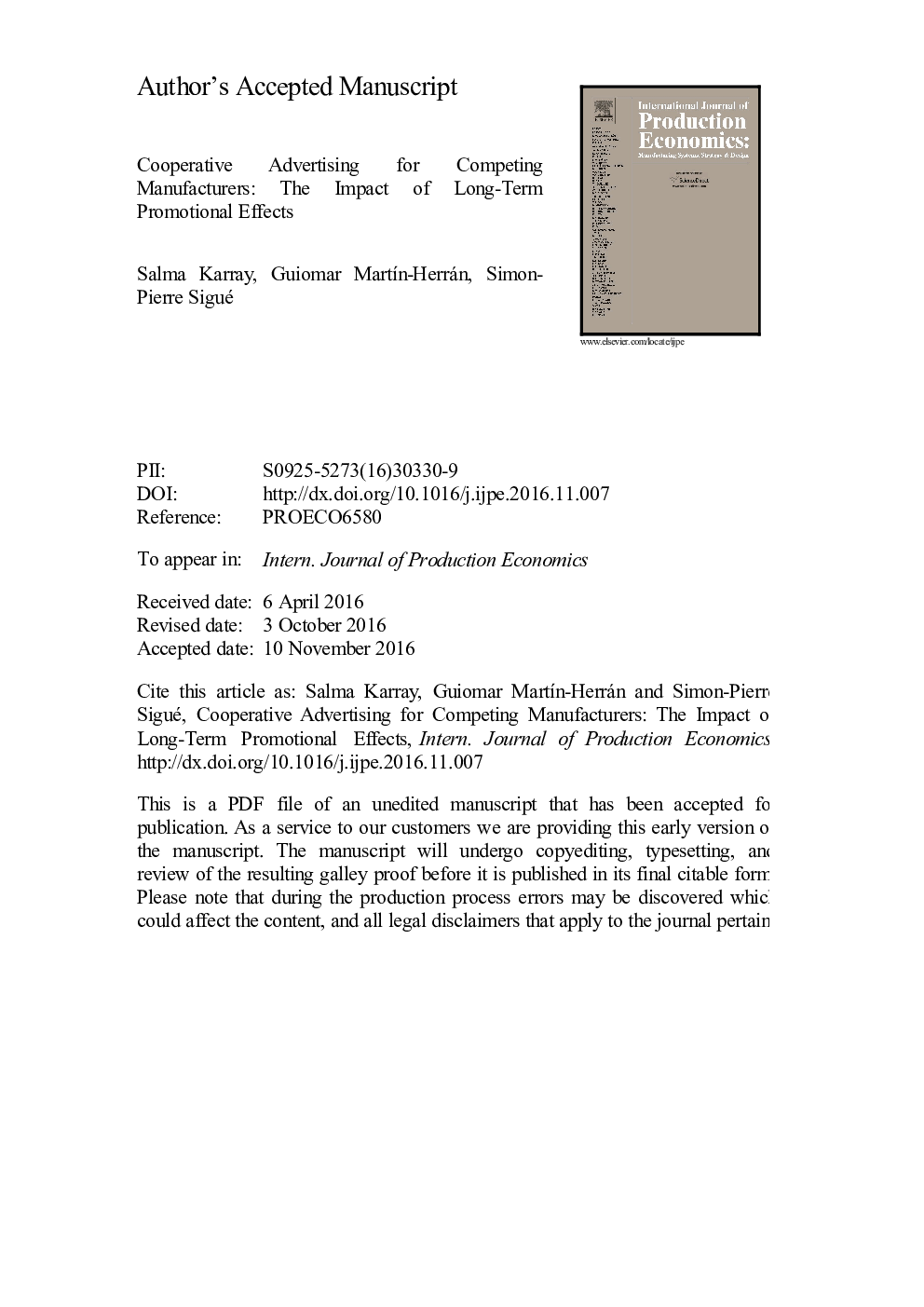| کد مقاله | کد نشریه | سال انتشار | مقاله انگلیسی | نسخه تمام متن |
|---|---|---|---|---|
| 5079049 | 1477520 | 2017 | 33 صفحه PDF | دانلود رایگان |
عنوان انگلیسی مقاله ISI
Cooperative advertising for competing manufacturers: The impact of long-term promotional effects
ترجمه فارسی عنوان
تبلیغات تعاونی برای تولیدکنندگان رقیب: اثر اثرات تبلیغاتی طولانی مدت
دانلود مقاله + سفارش ترجمه
دانلود مقاله ISI انگلیسی
رایگان برای ایرانیان
کلمات کلیدی
تبلیغات تعاونی، مدیریت زنجیره تامین، نظریه بازی، بازاریابی یا رابط کاربری،
ترجمه چکیده
اثربخشی برنامه های تبلیغاتی تعاونی در بازار مورد بررسی قرار می گیرد که دو تولید کننده رقیب با یک خرده فروش منحصر به فرد و دو محصول مقابله می کنند. دو مدل نظری بازی دو مرحله ای برای تحلیل اثرات دراز مدت تبلیغاتی خرده فروشان، که می تواند مثبت یا منفی باشد، بر اثربخشی تبلیغات مشارکتی ایجاد شده است. راه حل های تعادل بستر به دست آمده و مقایسه می شود. ما متوجه می شویم که سطح تعویض محصول و نشانه و میزان تاثیرات بلندمدت تبلیغاتی خرده فروش در فروش تعیین می کند که آیا تبلیغ تعاونی باید توسط سازندگان و خرده فروشان پذیرفته شود و پذیرفته شوند. به طور خاص، بسته به سطح تعویض محصول، تبلیغات تعاونی می تواند به نفع هر دو تولید کننده و خرده فروش حتی زمانی که تبلیغات خرده فروش منفی بر فروش آینده تاثیر می گذارد. برعکس، ممکن است سازندگان علاقه مند به ارائه تبلیغات تعاونی نباشند، در حالی که محصولات نسبتا بی تفاوت هستند بدون در نظر گرفتن ماهیت اثرات درازمدت تبلیغات. در نهایت، تولید کنندگان و خرده فروشان ممکن است به ارائه پیشنهاد یا مشارکت در برنامه های تبلیغاتی تعاونی که موجب افزایش سود کل کانال می شوند، حاضر شوند.
موضوعات مرتبط
مهندسی و علوم پایه
سایر رشته های مهندسی
مهندسی صنعتی و تولید
چکیده انگلیسی
The effectiveness of cooperative advertising programs is studied in a market where two competing manufacturers deal with an exclusive retailer and two products. Two two-stage game theoretic models are developed to analyze the long-term effects of retailer's promotions, which can be positive or negative, on the effectiveness of cooperative advertising. Closed-form equilibrium solutions are obtained and compared. We find that the level of product substitutability and the sign and magnitude of the long-term effects of retailer's promotions on sales determine whether cooperative advertising should be offered and accepted by the manufacturers and retailer. In particular, depending on the level of product substitutability, cooperative advertising can benefit both the manufacturers and retailer even when retailer's promotions negatively affect future sales. Conversely, it may not be in the interest of the manufacturers to offer cooperative advertising when the products are fairly undifferentiated regardless of the nature of the long-term effects of promotions. Finally, the manufacturers and retailer may refuse to respectively offer or participate in cooperative advertising programs that enhance total channel profits.
ناشر
Database: Elsevier - ScienceDirect (ساینس دایرکت)
Journal: International Journal of Production Economics - Volume 184, February 2017, Pages 21-32
Journal: International Journal of Production Economics - Volume 184, February 2017, Pages 21-32
نویسندگان
Salma Karray, Guiomar MartÃn-Herrán, Simon-Pierre Sigué,
